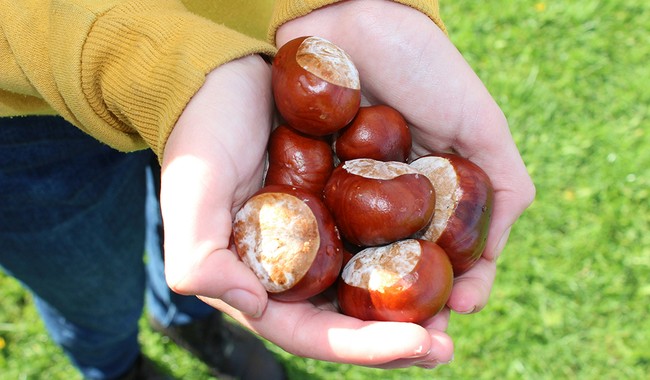
Tucked away in a drawer in my personal dresser, wrapped in cotton, in a small box, is an ancient horse chestnut, or “buckeye.” This is something similar to the British chestnut of Christmas “roasting by an open fire” fame, but the North American version. This one is old, stained black by decades of being carried in a pocket before it was retired to that dresser drawer. It was given to me when I was five or six, by an elderly neighbor.
Brownie was a WW1 veteran; he and his wife Grace had two children, a boy and a girl, and the boy was killed in WW2. Browning always said I reminded him of “Junior” and he was a great bonus Grandpa when I was a little tad; he gave me that horse chestnut and told me it would bring me luck, and I habitually carried it around with me for probably fifty years.
I’ve had a pretty damn good life, four beautiful daughters, six happy, healthy grandkids, and a wife I love more than life itself – so I guess that buckeye Brownie gave me all those years ago worked.
Now, I told you that story so I could tell you this one: In the United Kingdom, there is an interesting annual event called the World Conker Championships. The present champion has been beset by a cheating scandal involving a steel chestnut – I bet “steel chestnut” wasn’t on your bingo card for the day – and he’s just been cleared, and is free to resume cracking chestnuts.
A British chestnut-whacking champion was cleared Monday of cheating after an investigation into alleged malfeasance at the World Conker Championships.
Organizers of the nutty annual event said that Dave Jakins, a veteran competitor nicknamed “King Conker,” did not use a steel chestnut to conquer his rival.
The traditional game, played by generations of British schoolchildren, involves players using conkers — the glossy brown seeds of the horse chestnut tree — threaded onto a string to try and smash their opponent’s chestnut.
More than 200 conkers enthusiasts entered the annual competition in the village of Southwick in central England earlier this month. Jakins, 82, won the men’s tournament. But organizers launched an investigation after claims that he might have used a steel chestnut that was in his pocket.
That seems an odd sport (I mean, they are British) but at least we should be able to expect a fair and above-board competition. And, after an investigation, we see that’s what the conker-clankers are getting.
Investigators said they studied film and photo evidence and took testimony from judges and umpires, and concluded that “it would be near impossible for Mr. Jakins to have swapped the conkers unnoticed.”
If there’s one thing I wouldn’t want to be caught doing, it’s swapping conkers.
Local traditions can look pretty odd to outsiders. When I was a kid back in Allamakee County, Iowa, one local spring tradition was milking rattlesnakes. No, I’m not kidding.
People would fan out into the rocky hills with snake sticks and glass vials covered with stretched rubber sheets. Snakes were caught and carefully moved to bring their open mouths in contact with the rubber covering the mouth of the jar. Then with a judicious application of pressure in the right spot, one could “milk” the snake’s venom. Not that seems an odd hobby – until you know that the venom so collected was used to make antivenin to treat people who are bitten.
Of course, there’s a method to the snake-milking madness. What purpose there is in cracking conkers, I can’t imagine, any more than I can imagine a real purpose behind such traditions as bestowing patents of nobility on livestock – or using rodents to predict the weather.
SEE RELATED: King Bestows Royal Title on Goat Breed
Happy Groundhog Day – May We All Enjoy an Early Spring!
So, we shouldn’t be too quick to criticize British conker cracking competitions. As long as the competition is honest.
I mean, it’s not the strangest of local traditions. Some people juggle geese.
